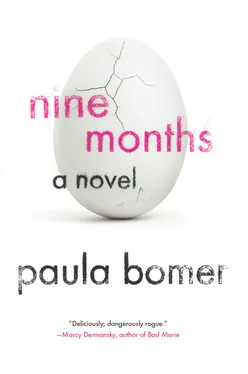Paula Bomer - Nine Months
Здесь есть возможность читать онлайн «Paula Bomer - Nine Months» весь текст электронной книги совершенно бесплатно (целиком полную версию без сокращений). В некоторых случаях можно слушать аудио, скачать через торрент в формате fb2 и присутствует краткое содержание. Год выпуска: 2012, ISBN: 2012, Издательство: Soho Press, Жанр: Современная проза, на английском языке. Описание произведения, (предисловие) а так же отзывы посетителей доступны на портале библиотеки ЛибКат.
- Название:Nine Months
- Автор:
- Издательство:Soho Press
- Жанр:
- Год:2012
- ISBN:978-1-61695-147-4
- Рейтинг книги:3 / 5. Голосов: 1
-
Избранное:Добавить в избранное
- Отзывы:
-
Ваша оценка:
- 60
- 1
- 2
- 3
- 4
- 5
Nine Months: краткое содержание, описание и аннотация
Предлагаем к чтению аннотацию, описание, краткое содержание или предисловие (зависит от того, что написал сам автор книги «Nine Months»). Если вы не нашли необходимую информацию о книге — напишите в комментариях, мы постараемся отыскать её.
Nine Months — читать онлайн бесплатно полную книгу (весь текст) целиком
Ниже представлен текст книги, разбитый по страницам. Система сохранения места последней прочитанной страницы, позволяет с удобством читать онлайн бесплатно книгу «Nine Months», без необходимости каждый раз заново искать на чём Вы остановились. Поставьте закладку, и сможете в любой момент перейти на страницу, на которой закончили чтение.
Интервал:
Закладка:
“Really, Sonia, you’d do that for me?”
Larissa snored, her head bobbed up. “Guys, I gotta go to bed. I have to work tomorrow. Are you still going to be here, Sonia?”
“I don’t know.” Sonia says. “But Larry, I think I’ve figured it all out. At first I thought the gum was gross, just disgusting, all over your car. But now, I think I’ve discovered you, and you are the future of art.” He passes the joint to her. Three hits? She feels so perfect. “No, no I’m perfect. This is all perfect. I sort of left my family and I–I really don’t want to be pregnant. I thought I wanted to paint and not have more babies and— I’m really high right now. Anyway, but now that I’ve discovered you, you Larry— I feel OK.”
Sonia sits down. Larry, red-eyed, is rapt. Sonia goes on. “But here’s the deal. I think I missed my chance when I was painting my friends as Hindu gods. I’d use these pictures of Krishna and Shiva and so on and then I’d paint the faces of my friends, you know, in the place of Krishna’s face. And someone told me, you have to paint the faces of famous people, not your friends.” Sonia has never known something to be so true as what she is saying right now. She sits here, in Larissa’s trailer, and she leans on the table and puts her hands on Larry’s face. “And he was right! My friend. And I didn’t listen to him. And now I know. And you need to make your gum design in the shape of famous people . Not dogs or smiley faces. But, like, Madonna! Robert De Niro. Right? Do you get it?”
Larry gently removes Sonia’s hands. “Wow. You’re a genius. That is the perfect idea.”
Larissa stands, wavering. “Sonia! I’m asleep. You guys gotta go. I’ll see you tomorrow. Sonia, let’s not be mean to each other.”
“You were always mean to me.”
“That’s because you always thought you were better than me, better than everyone else.”
Sonia is silent. This is true. “Larissa, I think I discovered the future of art on your bathroom wall. And Larry, it’s all Larry.”
“That’s great. Go home. I’ll see you tomorrow.”
“I’m staying at the Marriott. That’s how I ran into Larry.”
Larissa is expertly moving them out the door.
“Tomorrow. After work. We’ll see you again.”
16
Sonia wakes up, confused as she often has been, and it takes a moment to remember where she is. She’s in a bed at the Marriott Hotel, in South Bend, Indiana. She grew up in South Bend. The sheets are really nice. Nicer than the various other hotels she’s been staying in, nicer than the sheets at the Holiday Inn Express in Eastern Ohio. Her room is fabulously dark, even though she looks at the clock and it says 11:30 A.M. She remembers pulling the shades closed last night and they are heavy, wonderful shades. She’s in a cave of sleep, but slowly coming out of it. She had no dreams, but now thoughts of Dick and her boys flit through her head and she represses the urge to call them. She stands to go pee.
Last night, she thinks, peeing. That weed was something else. She’ll have to call Larry if she doesn’t see him at the hotel. She remembers the gum, the ecstatic vision of the future of art. Wow she was high. And from so little — what did she have, two hits? Gum art! How fucking gross. And how did she think he would be able to make more than smiley faces — well, she guesses he could — but famous people? Maybe she should smoke weed more often, though. Maybe it would help her painting. If she ever paints again.
After a room service breakfast of eggs, beef hash and toast, and a hot shower with excellent water pressure, Sonia drives to her old house, the house she and Nicky grew up in, the house her parents had lived in for thirty years. She pulls up right in front and parks. It’s exactly the same. Beige brick on the bottom half, white siding on the top. A slate roof — that might be new. Four windows in the front. Houses like this, generic, sensible, modest — they always remind Sonia of faces.
She really had no complaints about her childhood — what was the point? At a certain point — preferably before thirty — people should move on to take responsibility for their lives. And she had. Nicky had been different. She nursed resentments, remembering details of neglect or hurt that Sonia questioned and still questions if they were even true. That’s what bad therapy will do to you, turn you into a perpetually wounded child. Sonia gets out of the car, walks to the door and knocks.
A woman in her sixties answers the door, gray hair, brown eyes, trim, wearing a blue oxford shirt.
Sonia tells the woman her name. “I grew up here …” she says.
Sonia peeks in over the woman’s head. The entranceway is painted bright yellow and there’s a sign with a teddy bear stuck to it that says, “Welcome To Our Home.” This is something that would have made her mother cringe. In its place had hung one of the many of her mother’s etchings. Her mother, the amateur artist and content to be that, or seemingly so. Sonia had always wanted more than that.
“Oh yes, we bought the house from your parents when they retired to Florida.”
“I happen to be in town and was wondering if I could look around.”
“Of course. Come in,” the woman says, “My name is Alison Bower.”
They shake hands and Sonia says, “Nice to meet you.” The kitchen, off to the left, is entirely different, which isn’t a bad thing. It’s all tasteful, large tile floors with a subdued wooden table. Still, something aches in Sonia, the memory of her mother standing at the counter, singing to herself, bright-green leaf wallpaper glaring all around. The dented linoleum floors, dented from Sonia constantly leaning back on her chair. Those dents, which drove her mother crazy, they come back to Sonia now and she thinks, each one was a moment in life, a moment in exuberant childhood.
“The house we grow up in is always very significant. Your whole childhood took place here,” Alison says, and makes a sweeping motion with her hands.
Sonia is looking around and her heart aches. Everything disappears. Not just trailers. Lives. Kitchens. Her childhood bedroom, where it all started, her life. Alison seems to register this.
“Of course, we renovated when we moved in.”
“Of course,” says Sonia. “I understand.”
“Would you like a cup of tea or something?”
“I’d love a glass of water.” Sonia says.
“Please have a seat. You must be due very soon!”
“Yes.” Sonia sits in the familiar but unfamiliar kitchen. It seems smaller than she remembers. The house seems smaller, but she knows it’s just that most of her memories took place when she was a child and she was small. Like her boys are. Making memories, every day seems like a lifetime, and now those lifetime-long days are being made without her.
“I’m going to go up to my old bedroom if that’s OK.”
“Sure thing. Take your time. I don’t know what room was yours — one is a guest bedroom now and the other an office.”
“It’s all fine. I’m just never here so I thought I’d take advantage and pay a visit.”
“Like I said, take your time.”
Sonia walks up the hardwood stairs that were once carpeted in beige. The handrail is the same wooden, smooth handrail. She holds on to it. It got her in trouble. She constantly slid down handrails, well into her teens when it seemed childish and inappropriate.
She goes into her room and shuts the door. The office. The walls are quite bare with the exception of a framed Matisse print, a still life, flowers. There’s a bulletin board as well, but Sonia, feeling somewhat well-mannered, doesn’t scrutinize it. Otherwise there’s a large, green armchair, a filing cabinet and a beautiful midcentury desk. She sits in a chair in front of the desk and closes her eyes. When she was little, it was all green carpeting and a twin bed and stuffed animals. Then it morphed into her den of hedonism — she had a queen mattress on the floor — for some reason that felt sexy to her — and her bedspread was an Indian print. Nicky’s room was more conservative, blue rugs and a matching blue bedspread with a flower print on a twin bed. Nicky, who lives in Boulder now. She has a son that Sonia met once when Nicky came to New York for a wedding — the boy was an infant then. He must be seven or so now. She hasn’t seen Nicky in so long. They weren’t close. It was the cliché of two children growing up in the same house, but in different families. Very Psychology 101, but very true. Then again, sometimes Sonia thinks people choose to see their families differently, and it’s more that choice than any “different family” shit. Then there was just plain different interests, different personalities. Nicky wanted to go to college out West and climb mountains and ride horses. Sonia wanted to go to the East and live in a big sophisticated city and make art and talk pretentiously about art. But they were sisters. They did grow up together. And there’s something about the sibling relationship that is even more significant than the parental relationship. One’s parents had a full life beforehand. You come into their lives when they are adults. But siblings know each other from birth, witness the constant formation of character through childhood, through a child’s eyes, too.
Читать дальшеИнтервал:
Закладка:
Похожие книги на «Nine Months»
Представляем Вашему вниманию похожие книги на «Nine Months» списком для выбора. Мы отобрали схожую по названию и смыслу литературу в надежде предоставить читателям больше вариантов отыскать новые, интересные, ещё непрочитанные произведения.
Обсуждение, отзывы о книге «Nine Months» и просто собственные мнения читателей. Оставьте ваши комментарии, напишите, что Вы думаете о произведении, его смысле или главных героях. Укажите что конкретно понравилось, а что нет, и почему Вы так считаете.












